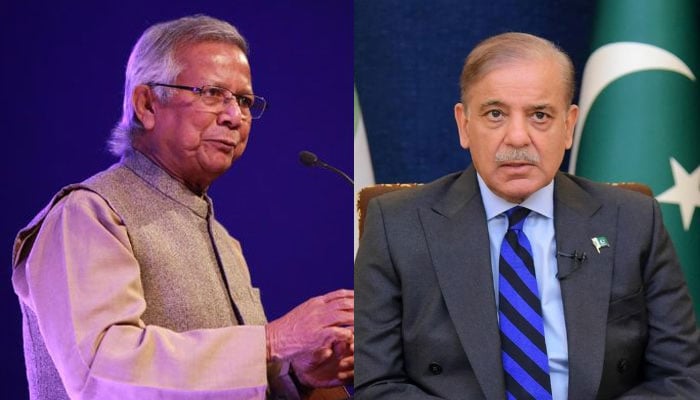Thaw in ties
Last week, a cargo departed from Karachi port and arrived at Bangladesh’s Chittagong Port
Ever since the end of former Bangladesh prime minister Sheikh Hasina’s autocratic rule, there have been unmistakable signs of a revival in Pakistan-Bangladesh ties. Last week, a cargo vessel that departed from the Karachi port arrived at Bangladesh’s Chittagong Port, establishing the first-ever direct maritime link between the two countries. Pakistan’s high commissioner to Bangladesh reportedly termed the direct shipping route a major step towards enhancing bilateral trade and business ties between Pakistan and Bangladesh and a more integrated trade network across the region. Pakistani goods previously had to be off-loaded onto feeder vessels – usually in Sri Lanka, Malaysia or Singapore – before travelling to Bangladesh. And, in a major step towards enhancing academic collaboration between the two countries, Dhaka University has officially reversed its ban on admitting Pakistani students. Under the updated policy, Pakistani students will now be eligible to enroll at Dhaka University, while Bangladeshi students will similarly be encouraged to pursue higher education opportunities in Pakistan. These are welcome developments for Pakistan, raising the potential for the country to build stronger trade, diplomatic and educational ties with more countries. Having a wide repertoire of international allies and partners is becoming more and more important in an increasingly multipolar world. It is also encouraging to see that at least some in the South Asia region can overcome historic conflicts to move the region towards greater cooperation and integration.
These are two things that have been hard to come by in this part of the world, where bilateral ties are often strained by past wars, ethno-religious divides and ongoing unjust occupations. Much of Sheikh Hasina’s rule fit this pattern, at least when it came to Pakistan, as her tenure saw little progress in bilateral relations. Instead, Hasina’s policies drew her country closer to India, sidelining Pakistan. The decision of Dhaka University to allow Pakistani students and the establishment of direct maritime ties are signs that things are now moving in another direction. It also goes to show that, unlike what many foreign (usually Western) analysts have predicted, there is an alternative to Indian hegemony in South Asia.
However, it is too early to say whether the recent thaw in Pakistan-Bangladesh ties is going to become a permanent feature of regional politics. The two countries certainly do share similar interests and problems, including climate change, socioeconomic inequality, and the need for more robust inter-regional trade. Both nations also stand to gain from collaborative approaches in addressing these challenges, as stronger ties can bring economic benefits and foster mutual understanding. But politics is a fickle beast, and the pendulum can easily swing back in the other direction in the coming years. One can only hope that leaders in both Pakistan and Bangladesh take this opportunity to build the sort of lasting linkages that can ensure strong ties on a lasting basis and help solve any disagreements that do come up amicably. Only through sustained efforts and mutual trust can these recent gains translate into a meaningful and enduring partnership.
-
 Bad Bunny Faces Major Rumour About Personal Life Ahead Of Super Bowl Performance
Bad Bunny Faces Major Rumour About Personal Life Ahead Of Super Bowl Performance -
 Sarah Ferguson’s Links To Jeffrey Epstein Get More Entangled As Expert Talks Of A Testimony Call
Sarah Ferguson’s Links To Jeffrey Epstein Get More Entangled As Expert Talks Of A Testimony Call -
 France Opens Probe Against Former Minister Lang After Epstein File Dump
France Opens Probe Against Former Minister Lang After Epstein File Dump -
 Last Part Of Lil Jon Statement On Son's Death Melts Hearts, Police Suggest Mental Health Issues
Last Part Of Lil Jon Statement On Son's Death Melts Hearts, Police Suggest Mental Health Issues -
 Leonardo DiCaprio's Girlfriend Vittoria Ceretti Given 'greatest Honor Of Her Life'
Leonardo DiCaprio's Girlfriend Vittoria Ceretti Given 'greatest Honor Of Her Life' -
 Beatrice, Eugenie’s Reaction Comes Out After Epstein Files Expose Their Personal Lives Even More
Beatrice, Eugenie’s Reaction Comes Out After Epstein Files Expose Their Personal Lives Even More -
 Will Smith Couldn't Make This Dog Part Of His Family: Here's Why
Will Smith Couldn't Make This Dog Part Of His Family: Here's Why -
 Kylie Jenner In Full Nesting Mode With Timothee Chalamet: ‘Pregnancy No Surprise Now’
Kylie Jenner In Full Nesting Mode With Timothee Chalamet: ‘Pregnancy No Surprise Now’ -
 Laura Dern Reflects On Being Rejected Due To Something She Can't Help
Laura Dern Reflects On Being Rejected Due To Something She Can't Help -
 HBO Axed Naomi Watts's 'Game Of Thrones' Sequel For This Reason
HBO Axed Naomi Watts's 'Game Of Thrones' Sequel For This Reason -
 King Charles' Sandringham Estate Gets 'public Safety Message' After Andrew Move
King Charles' Sandringham Estate Gets 'public Safety Message' After Andrew Move -
 Lewis Capaldi Sends Taylor Swift Sweet Message After 'Opalite' Video Role
Lewis Capaldi Sends Taylor Swift Sweet Message After 'Opalite' Video Role -
 Brooklyn Beckham Plunges Victoria, David Beckham Into Marital Woes: ‘They’re Exhausted As It Seeps Into Marriage
Brooklyn Beckham Plunges Victoria, David Beckham Into Marital Woes: ‘They’re Exhausted As It Seeps Into Marriage -
 Sarah Ferguson Joins Andrew In ‘forcing’ Their Daughters Hand: ‘She Can Lose Everything’
Sarah Ferguson Joins Andrew In ‘forcing’ Their Daughters Hand: ‘She Can Lose Everything’ -
 'Bridgerton' Author Reveals If Actors Will Be Recast In Future Seasons
'Bridgerton' Author Reveals If Actors Will Be Recast In Future Seasons -
 50 Cent Super Bowl Ad Goes Viral
50 Cent Super Bowl Ad Goes Viral




